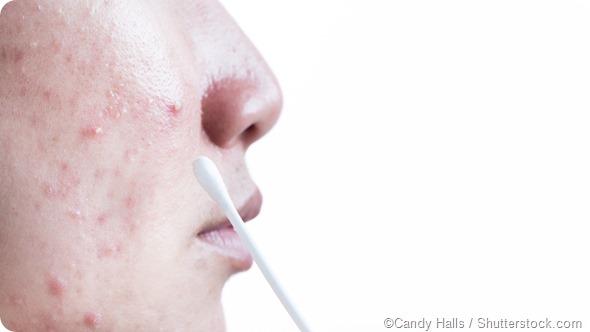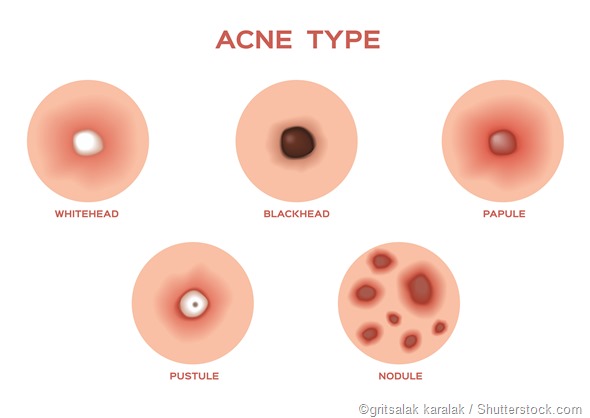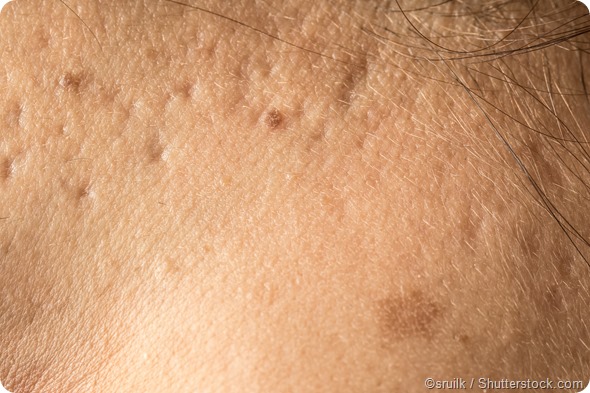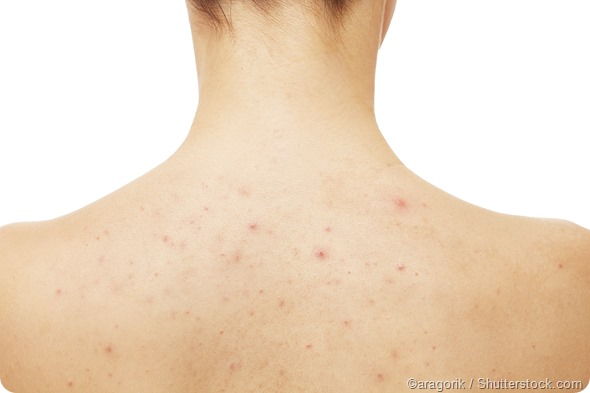
What causes acne?
Acne develops due to an interplay between genetic factors (so people often have a family history) and hormonal factors that can increase the size and activity of the sebaceous or oil gland.
There are some rare causes, for example certain types of make-up products can aggravate acne. It can sometimes occur in association with other medical problems such as polycystic ovary syndrome or congenital adrenal hyperplasia. Certain drugs such as lithium and steroids can be a contributing factor.
More recently we're discovering some lifestyle factors as well: diet, particularly high GI foods, and to a lesser degree, some dairy products.
What types of spot are there?
Acne can be non-inflammatory or inflammatory. Non-inflammatory acne refers to comedones, which are blackheads and whiteheads.
Inflammatory acne includes:
- papules - small red bumps that develop underneath the skin
- pustules - red bumps that are filled with white pus
- nodules and cysts - deep spots that tend to last a couple of weeks and are quite painful

When should you seek help for acne? Should you visit a family doctor, a dermatologist or a pharmacist?
The first thing people tend to do when they’ve got mild acne is buy over the counter products, products that contain benzyl peroxide or salicylic acid. If you've been using those products for a few weeks and things fail to improve, that is the point you should go and see your GP. Your GP is able to prescribe a variety or topical and oral agents.
If you've been seeing your GP but your acne is affecting your self-esteem, starting to cause scarring, or there is no response to treatment, it may be worth consider a specialist opinion from a board certified dermatologist. In the UK, this can be checked on the General Medical Council online specialist register.
Can acne cause lasting damage such as scarring of the skin?
For patients that have severe acne, i.e. nodulocystic acne, about 20% will develop scarring of the skin. Deep inflammation or picking spots will increase the likelihood of developing a scar.

What psychological effects can acne have?
There are a number of psychological effects associated with acne. We recognize that acne can cause problems with low self-esteem, body confidence, social withdrawal and depression.
Unfortunately, these effects can often be overlooked. I think if acne or acne scars are affecting self-esteem and stopping individuals leading their lives they way they want to, it is worthwhile seeing a specialist.
What general advice and self-help tips would you give to someone with acne?
I think firstly, a lot of people are very prone to over washing the skin because they think that will help, and often what that can do is make the skin more irritated. You should stick to cleansing your skin morning and evening.
Products that contain salicylic acid and zinc are helpful as are targeted spot treatments. These can be purchased over the counter and examples are tea tree oil, products that contain salicylic acid, benzoyl peroxide and niacinamide, which can be put directly onto the spots themselves.
Secondly, it is also a good practice to avoid excessive exfoliation which will also cause over-dryness and over-irritation. If you've got acne-prone skin, a good guide is not to exfoliate more than once a week.
Should you moisturize if you have acne? What about using make-up?
You should still moisturize; oily skin doesn't necessarily mean it's hydrated. Go for products that are non-comedogenic, this includes with make-up. Just to clarify, it is okay to wear make-up but it should be make-up that is light and not likely to promote the formation of blackheads.
Should you squeeze spots?
Absolutely not, squeezing a spot can push the inflammation deeper and this can cause scarring of the skin.
There are procedural treatments were blackheads can be extracted but these need to be carried out by someone trained appropriately. A tool called an extractor can be used but care needs to be taken as if done correctly, it can result in pushing inflammation deeper into the skin or even scarring.

Are there any ways to prevent acne?
Your genetics cannot be changed and if you've got a strong family history, there is a high probability you may also suffer. It is important to do simple things like take your make-up off every night, because if you leave that on, it will block your pores.
If you go to the gym a lot, it is a good idea to shower straight away so you're not sitting with the sweat against that clothing, because that can often clog your pores and can be a common cause of back or chest acne.
there is limited evidence to support the effects of diet on acne and reducing your diet in high GI foods, and to a lesser degree dairy, may have some benefit in select individuals.
Does acne just affect young people or can it affect adults too?
Approximately 80% of people will suffer with acne at some point in their lives. Acne can affect adults as well as young people, about 20% of women will suffer with female adult acne over the age of 25 and for men this is about 8%, so there is a much higher rate of adult acne in women than in men.
Older people that suffer with acne, may have separate psychological issues that accompanies it because it's still seen, typically, as a teenage problem. This can cause a lot of adults that suffer with adult acne to feel socially isolated.
Where can readers find more information?
Good websites for sources of info are:
About Dr Anjali Mahto
 Dr Anjali Mahto is a UK trained NHS and private dermatologist based in London. Her medical training took place in South Wales, where she also obtained a degree in Pharmacology.
Dr Anjali Mahto is a UK trained NHS and private dermatologist based in London. Her medical training took place in South Wales, where she also obtained a degree in Pharmacology.
She completed higher specialist training in dermatology in a competitive London rotation. During this time, she gained experience in some of the UK’s leading teaching hospitals including Imperial College Healthcare and the Royal Free Hospital, Hampstead.
She now consults children and adults with all problems relating to the skin, hair, and nails.